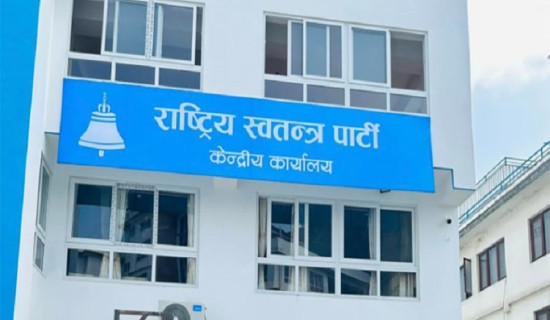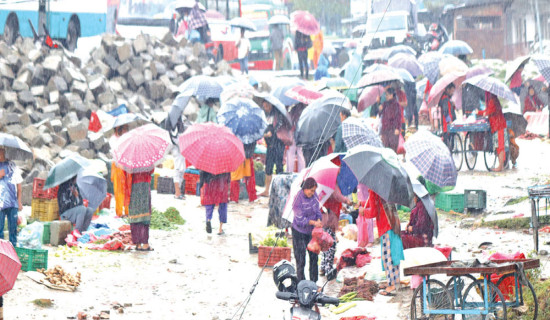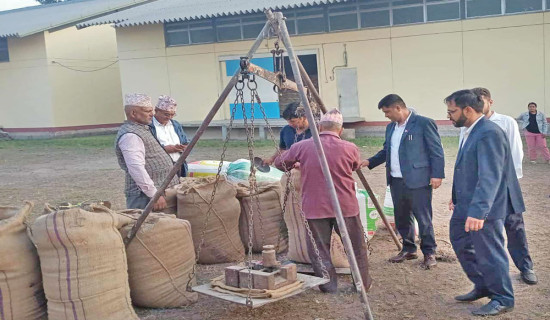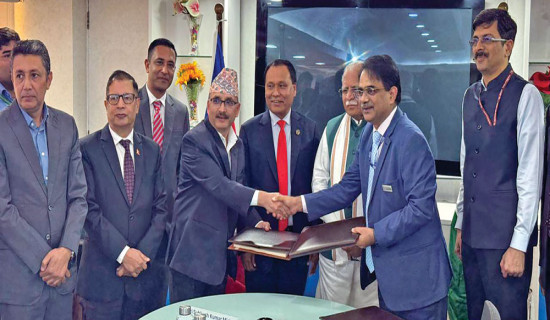- Sunday, 30 November 2025
Govt unveils principles and priorities for new budget
Kathmandu, Feb. 27: The government has presented the principles and priorities of the budget for the fiscal year 2024/25 in the House of Representatives Monday.
Finance Minister Dr. Prakash Sharan Mahat presented principles and priorities for the coming financial year focusing on increasing production and productivity by increasing public expenditure on priority projects.
The government has presented the outline of principles and priorities of the budget in the House of Representatives almost three months before the fiscal budget for next fiscal year, breaking the old practice.
In the past years, generally the government used to present principles and priorities hardly two weeks before presenting the budget.
Sustainable and inclusive economic growth, public finance balance and allocation efficiency improvement, social sector development and social justice, private sector and investment promotion, federalism and good governance promotion, sustainable development and climate change are the key principles of the government.
Similarly, hydropower development, modernization and commercialisation of agriculture, tourism development, development of information technology, industrial development and private sector promotion, infrastructure development, social sector development, social justice, green and uplifting development and disaster management, exploitation of demographic benefits and mobilisation of youth, strengthening of financial sector, the rule of law and international cooperation and relations are the priorities of the government.
Minister Dr. Mahat said that the budget for the next financial year will be prepared with the priority of achieving a high economic growth rate by maintaining macroeconomic stability and raising the living standard of citizens.
He said that the next budget will be formulated to advance the country's economy at par with the world economy and uplift the living standard of people who are in a difficult situation to meet their basic needs.
Presenting the principles of budget, FM Mahat said that for sustainable and inclusive economic growth, government resources will be mobilised to build necessary public infrastructure for areas that can contribute highly to economic growth, including energy, agriculture, tourism and information technology.
He said that the government’s budget will be advanced towards facilitating private sector investment to increase production and productivity and create jobs inside the country.
“Efficiency in allocation of public expenditure will be increased. More prioritisation will be done in order to make public expenditure reasonable, construction work will be carried out only on pre-assessed projects and priority projects will not be deprived of resources,” he said.
He said that public expenditure will be qualitatively increased and mobilised to encourage private investment as well. Controlling current expenditure will be phased out of dual functional structures, he said.
“Necessary funds will be allocated to complete projects under construction and projects where resources have been secured.
The policy of allocating the budget will be taken only for the projects that have completed the basis and criteria of project classification and the preliminary preparations have been completed,” he said.
He said that the revenue mobilisation would be more effective while adopting business and investment-friendly taxation policy. The public resources will be invested in service delivery, socio-economic infrastructure development and human capital building, he said.
The duplication of all types of subsidies and benefits provided by the state will be eliminated and arrangements will be made to focus on the target groups. The necessary policy, legal and institutional reforms will be made to create a favourable environment for domestic and foreign investors to increase investment through the investment conference to be held in April 2024.
The Finance Minister said that the public service delivery will be made more citizen-friendly and simple in line with the norms and values of the federal government.
“Optimum use of information technology will be made in public service,” he said. The government has given priorities to the development of the hydropower sector.
“The electricity generation will be increased by promoting domestic and foreign investment in hydropower. Emphasis will be placed on the development of the green economy in the country by increasing domestic consumption of electricity,” he said.
He said that priorities of the budget for the next fiscal year will be placed on commercialization and use of modern technology to reduce the high cost of production in agriculture.
“To make domestic production competitive, protection and production-based subsidy policy will be implemented. Sustainable supply of chemical fertilisers will be arranged,” he said.
The process of opening a chemical fertiliser factory in the country will be taken forward, he said, adding that farming based on natural and organic fertilisers will be encouraged. According to him, Nepal will be developed as an attractive tourism destination by developing quality tourism infrastructure.
“Obstacles will be removed to bring Pokhara and Bhairahawa airports into operation at full capacity. The construction process of Nijgadh International Airport will be advanced by finanising the investment framework,” he said.
He said that problems encountered in projects of national pride and strategic importance will be resolved and emphasis would be given to completing the construction of the Kathmandu Tarai Madhes Expressway, the highway linking the East-West highway and the corridor connecting North-South highway on time. It is the government's priority to advance the health insurance programme in accordance with the principles of insurance and to provide health services to more people through qualitative health services.
The government's priority is to develop youth-targeted entrepreneurship and create domestic employment, reducing the situation where young people have to go abroad for work.
International relations will be established on the basis of mutual benefits while enhancing balanced and mutual interests with neighboring and friendly countries, said Dr. Mahat.
The government has said that the benefits that can be obtained from the developed and emerging economies will be used through economic diplomacy.










-original-thumb.jpg)





